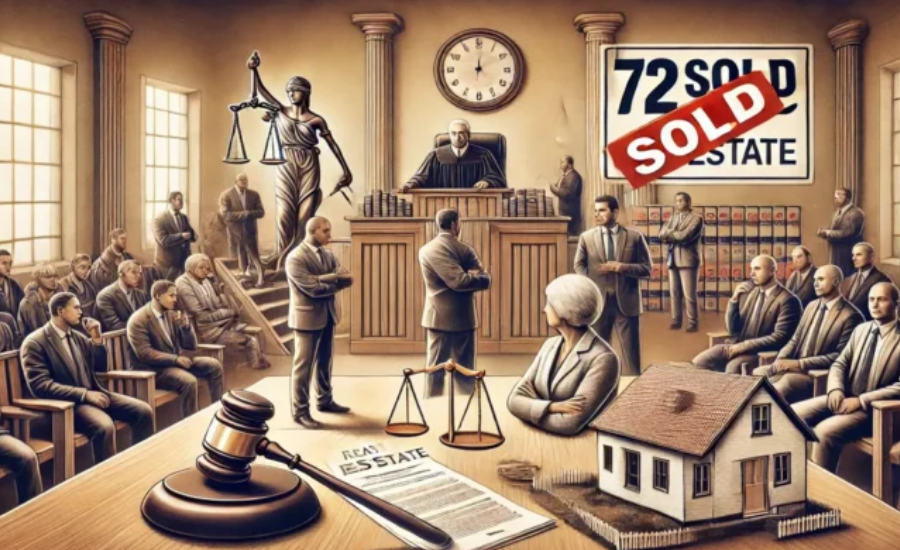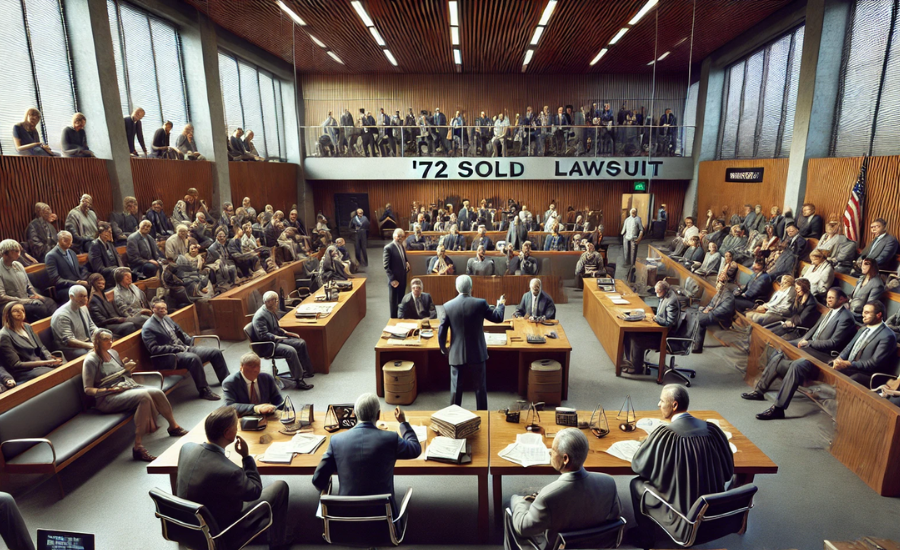Decoding the 72 Sold Lawsuit: A Deep Dive into Real Estate Allegations
The landscape of real estate transactions has recently been invigorated by the controversial 72 Sold lawsuit. This legal battle has ignited intense discussions regarding transparency in advertising, the responsibility of real estate companies, and the ethical conduct expected from agents. As the case unfolds, it has prompted a critical examination of how the industry balances the urgency of selling properties quickly with maintaining a trustworthy and transparent system.
At the heart of the 72 Sold lawsuit lies a pressing issue of truthfulness in marketing practices. The case challenges the integrity of how real estate companies present their services and the promises they make to potential clients. This scrutiny is not just about the specifics of this lawsuit but also about setting a precedent for how similar cases might be handled in the future. It underscores the need for greater accountability in the industry to ensure that marketing claims are accurate and that companies uphold ethical standards.
As stakeholders in the real estate sector grapple with the implications of the 72 Sold lawsuit, there is a broader conversation about redefining industry practices. The case is forcing a re-evaluation of how agents and companies navigate the tension between rapid transactions and ethical practices. This moment represents an opportunity for the industry to reassess its commitment to transparency and fairness, aiming to rebuild trust and set higher standards for future dealings.
The Controversy Surrounding 72 Sold

At the core of the current debate is 72 Sold, a real estate firm that has introduced an unconventional method for selling homes. Established in 2018 by Greg Hague, a notable figure in Arizona’s real estate market, 72 Sold positions itself as a game-changer in the industry. The company claims to offer a revolutionary system capable of selling properties in an impressively short period of just eight days or even less, setting it apart from traditional real estate practices.
National Reach and Innovative Strategy
Operating in 38 markets across the United States, 72 Sold leverages its partnership with the renowned Keller Williams brokerage to extend its reach nationwide. This collaboration amplifies 72 Sold’s presence and effectiveness in the competitive real estate landscape. The company utilises an auction-like approach to create excitement and attract potential buyers, which is central to its selling strategy. This method aims to generate a sense of urgency and drive up interest in properties, appealing to those looking for a swift sale.
Impact on Homeowners and Investors
The distinctive approach of 72 Sold has resonated with both homeowners and real estate investors. For homeowners, the promise of a rapid and efficient sale addresses the common desire for a hassle-free transaction. This appeal is particularly strong in a market where traditional selling processes can be lengthy and cumbersome. On the other hand, real estate investors are drawn to the potential for increased liquidity in their portfolios, as the quick sale process could facilitate faster reinvestment opportunities.
Reactions and Controversies
Despite its innovative strategy, 72 Sold has not been without its share of controversies. Critics have raised questions about the effectiveness and transparency of the company’s methods. The rapid sales pitch may seem attractive, but it has also prompted discussions about whether the promise of an expedited sale comes at the expense of thorough market evaluation and fair pricing. This scrutiny highlights the need for a closer look at how 72 Sold’s promises align with actual market outcomes.
Allegations Against 72 Sold

The 72 Sold lawsuit is rooted in a series of serious allegations that challenge the company’s operational integrity and ethical practices. Central to the controversy is the accusation that 72 Sold has engaged in deceptive advertising, failing to meet its advertised promise of selling properties within an eight-day period. These claims question whether the company has been forthright in its marketing and if it has delivered on its ambitious sales promises.
Concerns Over Commissions and Fees
A significant aspect of the lawsuit involves concerns over the commissions and fees imposed by 72 Sold. The allegations suggest that the company may have employed misleading practices regarding its commission structure, potentially causing financial detriment to both buyers and sellers. This scrutiny raises questions about the transparency and fairness of the company’s fee arrangements and whether they align with industry standards.
Issues of Transparency
The lawsuit further alleges that 72 Sold has been less than transparent with homeowners, particularly regarding hidden fees and charges. According to the claims, the company failed to provide clear information about additional costs upfront, leading to unexpected financial burdens for clients. This lack of transparency has reportedly led to dissatisfaction among customers, who were confronted with unforeseen expenses during the selling process.
Legal and Ethical Implications
The legal action against 72 Sold highlights broader issues concerning ethical practices in the real estate industry. The allegations underscore the importance of honesty and transparency in real estate transactions and raise concerns about the impact of such practices on consumer trust. As the lawsuit unfolds, it may set important precedents for how similar cases are addressed in the future.
The Path Forward for 72 Sold
As the legal proceedings continue, the future of 72 Sold will likely be influenced by the outcome of these allegations. The company’s ability to address and rectify these issues will be crucial in determining its standing in the industry. The resolution of the lawsuit could lead to changes in how 72 Sold operates and may prompt broader industry reforms to enhance transparency and protect consumer interests.
Stakeholders in the 72 Sold Lawsuit

The 72 Sold lawsuit brings together a variety of stakeholders, each with distinct interests and viewpoints. Central to the case are the homeowners who turned to 72 Sold for its promise of a rapid property sale. These clients claim that the company’s marketing did not match their actual experience, leading to dissatisfaction over unmet promises and a lack of transparency.
The Position of 72 Sold and Its Leadership
On the other side of the legal battle are 72 Sold and its founder, Greg Hague, along with other key figures within the company. The lawsuit involves not only Hague but also other individuals who play significant roles in the company’s operations and management. Their defence against the allegations will be pivotal in shaping the outcome of the case.
Involvement of Regulatory Bodies
The lawsuit has also caught the attention of regulatory agencies and consumer protection organisations. These entities are monitoring the situation closely to ensure that industry standards are upheld and that consumer rights are protected. Their involvement highlights the broader implications of the case for regulatory practices and consumer safeguards in the real estate sector.
Broader Implications for the Industry
The diverse interests and perspectives represented in the lawsuit underscore the broader impact of the case on the real estate industry. The outcome could influence industry practices, particularly concerning transparency and advertising standards. This case may set important precedents for how real estate companies are held accountable for their marketing claims and service delivery.
Future Prospects and Industry Impact
As the lawsuit progresses, its resolution could have significant consequences for 72 Sold and the real estate industry as a whole. The case has the potential to drive changes in industry norms, promote greater transparency, and enhance consumer protection. Observers will be watching closely to see how the outcome shapes future real estate practices and regulatory approaches.
Interesting Facts
- 72 Sold’s Promises and Controversy: 72 Sold, a real estate company founded by Greg Hague, is at the centre of a lawsuit that questions the truthfulness of its marketing claims. The company promised to sell properties within eight days but faces allegations of failing to deliver on this promise.
- Advertising Practices Under Scrutiny: The lawsuit challenges the company’s advertising practices, accusing 72 Sold of misleading potential clients about the speed and efficiency of its property sales.
- Commissions and Fees in Question: Another major issue in the lawsuit involves the company’s commission structure and fees. Allegations suggest that 72 Sold may have used deceptive practices regarding these financial aspects, potentially harming both buyers and sellers.
- Transparency Concerns: The lawsuit also alleges that 72 Sold did not disclose hidden fees and charges upfront, leading to unexpected costs for clients. This lack of transparency has resulted in dissatisfaction among homeowners.
- Impact on Industry Practices: The case is prompting a broader reevaluation of industry practices, especially concerning how real estate companies balance rapid transactions with ethical conduct and transparency.
- Regulatory and Consumer Protection Attention: The lawsuit has attracted the attention of regulatory bodies and consumer protection agencies, highlighting its broader implications for industry standards and consumer rights.
- Stakeholders Involved: The lawsuit involves various stakeholders, including the homeowners who used 72 Sold’s services, the company itself, its founder Greg Hague, and other key figures associated with its operations.
- Potential Industry Reforms: The outcome of the lawsuit could lead to significant changes in how real estate companies operate, potentially driving reforms to enhance transparency and protect consumer interests in the industry.
Faqs
Q1. What is the 72 Sold lawsuit about?
A. The lawsuit involves allegations that 72 Sold engaged in misleading advertising, failed to deliver on its promise of selling properties within eight days, and was not transparent about fees and charges.
Q2. Who founded 72 Sold?
A. 72 Sold was founded in 2018 by Greg Hague, a notable figure in Arizona’s real estate market.
Q3. What are the main allegations against 72 Sold?
A. The main allegations include deceptive advertising practices, misleading commission and fee structures, and lack of transparency regarding hidden costs.
Q4. How does 72 Sold’s selling strategy work?
A. The company uses an auction-like approach to create urgency and attract buyers, claiming to sell properties in as little as eight days.
Q5. Who are the key stakeholders in this lawsuit?
A. Key stakeholders include the homeowners who used 72 Sold’s services, the company itself, its founder Greg Hague, and other key figures in the company’s management.
Q6. What impact could the lawsuit have on the real estate industry?
A. The lawsuit could lead to changes in industry practices, including improved transparency and ethical standards for real estate transactions.
Conclusion
The 72 Sold lawsuit has sparked significant debate over transparency and ethics in real estate. Allegations of misleading advertising, deceptive fees, and lack of transparency are at the forefront, prompting a reevaluation of industry practices. The case could lead to important changes in how real estate transactions are conducted, aiming to enhance trust and accountability in the industry.
Stay In Touch For More Updates And Alerts: England Tribune




